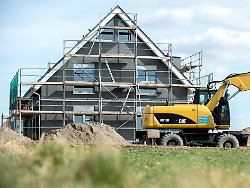Saturday 26 December 2020
Trend is increasing
Corona is driving Germans into their own homes
The housing industry is one of the big winners in 2020. Building societies can even look forward to double-digit growth rates – and are pouring out more money than ever before. Because despite the uncertain situation in the Corona crisis, many people rely on their own home.
The Corona crisis has plunged many people into livelihood worries – but the trend towards expensive home ownership has nevertheless intensified again. The construction industry puts the plus in residential construction nationwide this year at four percent, and the building societies can hardly save themselves from inquiries about construction financing.
Supported by a renewed increase in the demand for residential property and low interest rates, both the private and the public sector are reporting significant increases in this area, according to a survey. The head of the Association of Private Building Societies, Bernd Hertweck, says he expects the building funds paid out at the end of the year for the houses he represents to increase by 15 percent compared to 2019. This should break the mark of around 30 billion euros.
When it comes to mortgage lending, the private institutes represent around three quarters of the market. The rest is shared by the state building societies under public law, which are also expecting a total increase of around 15 percent this year. In 2019, the Landesbausparkassen paid their customers a total of 10.8 billion euros in construction finance.
The new figures underpin a thesis that was impressively confirmed in the pandemic: In times of crisis, regardless of all existential worries, people rely more than ever on home ownership. In contrast to other segments, the construction industry for residential construction is reporting a growth in sales. While the willingness of industrial groups and service companies to invest in construction projects is dwindling, the situation is very different for residential construction. "The pressure on the housing markets in the metropolitan areas has not weakened", emphasizes the President of the Main Association of the German Construction Industry, Peter Huebner. "Due to the trend towards home offices, which has been strengthened by Corona, owning a property seems even more desirable."
In Baden-Württemberg – the motherland of home builders, so to speak – this is exemplarily visible: At the end of the third quarter, the south-west construction industry reported a significant year-on-year increase in both sales and new orders. The value of incoming orders increased by a whopping 7.6 percent to 1.93 billion euros. The number of approved apartments and residential buildings was also higher here than in 2019. "Despite the Corona crisis, or perhaps because of it, people are increasingly investing in their own four walls. That promises security," says the general manager of the association, Thomas Möller. The building societies also benefit from this.
Contrary to many experts' assessments, there was no deterioration in the demand for residential property at the beginning of the pandemic, says a spokeswoman for the public institute. "On the contrary: demand has increased, as have prices on the property market." Hertweck, who is also the head of the Wüstenrot Bausparkasse, believes that German citizens limited their consumption in the corona pandemic and put money aside. But the own four walls clearly remained in trend. "In return, many are moving more and more to the hinterland of large cities and more rural areas."
Will the record hunt continue like this? In any case, the industry is adapting to it first. The construction industry expects a further increase in sales of three percent to 52.6 billion euros in the residential construction sector in 2021. Hertweck's boss at the Stuttgart-based financial group Wüstenrot & Württembergische, Jürgen A. Junker, is also confident: "After the family, the German's favorite thing is not only the car but also the house.
Situation can tip over quickly
In fact, however, the situation could change quickly – for example, if the automotive industry, which is important for Germany, should be in greater crisis and in extreme cases tens of thousands of best-paid industrial jobs suddenly endangered. "What would happen if there were massive bankruptcies and a severe recession is a different story. On the other hand, everything is done politically to ensure that payment difficulties do not fully materialize," comments the spokeswoman for the Landesbausparkassen. "And the positive prospects that Corona could be defeated with a vaccine by the end of 2021 give hope that the worst can be averted."
In any case, it cannot be said that the pandemic has so far not had a negative impact on the business of building societies. The signing of new home loan and savings contracts collapsed significantly, especially in the spring lockdown. For example, the private institutes in this area report a year-on-year decline of a whopping ten percent to a savings sum of only around 51 billion euros. The public-law building societies are even assuming a minus of around 15 percent in terms of new home loan and savings business to a total of around 28 billion euros.
Hertweck justifies the decline primarily with the more difficult customer contact in Corona times. "Increased video and telephone consultations as well as e-mail communication can only partially replace personal encounters." The state building societies assess the situation in a similar way: The conclusion of new savings contracts suffered badly from the corona-related closings of the branches in the spring, which were several weeks.
.
